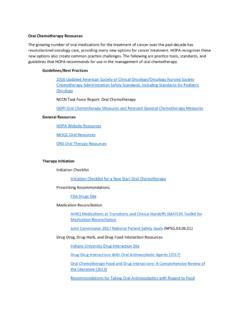Transcription of AC (DOXOrubicin/Cyclophosphamide) Every 21 Days Course
1 BRS5a chemotherapy Order Template .. Breast Cancer AC (DOXO rubicin/ cyclophosphamide ) Every 21 days PACLI taxel Every 21 days AC (DOXO rubicin/ cyclophosphamide ) Every 21. days Course page 1 of 2. INDICATION: REFERENCES: NCCN SUPPORTIVE CARE: Adjuvant 1. NCCN Clinical Practice Guidelines in 1. Emetic Risk: Day 1 High Oncology Breast Cancer. 2. Fever Neutropenia Risk: Intermediate 2. Mamounas EP, et al. J Clin Oncol. 2005;23(16) chemotherapy REGIMEN. 21-day cycle for 4 cycles DOXO rubicin 60 mg/m2 IV Push on Day 1. cyclophosphamide 600 mg/m2 IV over 30 minutes on Day 1. Oral hydration is strongly encouraged with cyclophosphamide ; poorly hydrated patients may need supplemental IV hydration.
2 Patients should attain combined oral and IV hydration of 2 3 L/day on day of chemotherapy . See example of recommended supplemental IV hydration below. This Course is 4 cycles of AC (DOXO rubicin/ cyclophosphamide ) Every 21 days . PACLI taxel Every 21 days is initiated following completion of this Course . Please see Order Template BRS5b for PACLI taxel Every 21 days Course . SUPPORTIVE CARE. Antiemetic therapy (See ). Aprepitant 125 mg PO or fosaprepitant 115 IV Day 1, aprepitant 80 mg PO days 2 3. AND. Dexamethasone 12 mg PO/IV Day 1, then 8 mg PO/IV days 2 4. AND. 5-HT3 antagonist: Ondansetron 16 24 mg PO or 8 12 mg (maximum 32 mg/day) IV Day 1.
3 OR. Granisetron 2 mg PO daily or 1 mg PO BID or mg/kg (maximum 1 mg) IV daily Day 1. OR. Dolasetron 100 mg PO or mg/kg IV or 100 mg IV Day 1. OR. Palonosetron mg IV Day 1. AND. Lorazepam 2 mg PO/IV or sublingual Every 4 or Every 6 hours days 1 4. PRN for breakthrough: Patients should be given at least one medication in a different category than that given above to have as needed for breakthrough. Please consult the NCCN Clinical Practice Guidelines in Oncology Antiemesis for appropriate antiemetic therapy. Template continued on page 2. This template is a peer-reviewed statement of the consensus of its authors derived from the NCCN Clinical Practice Guidelines in Oncology regarding their views of currently accepted approaches to treatment.
4 This template does not constitute an order. Any clinician seeking to treat a patient using this template is expected to use independent medical judgment in the context of individual clinical circumstances of a specific patient's care or treatment. NCCN disclaims all warranties, express or implied including, without limitation, the implied warranties of merchantability and fitness for a particular purpose. NCCN does not warrant the accuracy, currency, or completeness of the template or make any representation regarding the use or the results of the use of the template in treatment. In no event shall NCCN or its members be liable for any damages including, without limitation, incidental, indirect, special, punitive, or consequential damages arising out of or in connection with the use of this template including, without limitation, loss of life, loss of data, loss of income or profit, losses sustained as a result of any injury to any person, or loss or damage to property or claims of third parties.
5 2008 National Comprehensive Cancer Network BRS5a chemotherapy Order Template .. Breast Cancer AC (DOXO rubicin/ cyclophosphamide ) Every 21 days PACLI taxel Every 21 days AC (DOXO rubicin/ cyclophosphamide ) Every 21. days Course page 2 of 2. Myeloid growth factor therapy (see ). CSFs not generally recommended as primary prophylaxis based on FN risk of chemotherapy regimen. For more information on prophylaxis of FN, refer to NCCN Clinical Practice Guidelines in Oncology Myeloid Growth Factors and Appendix C to the NCCN. chemotherapy Order Templates. Other Supportive Therapy For cyclophosphamide : Example of recommended supplemental IV hydration: Sodium chloride infused IV at a rate of 3 mL/kg/hour for a total of 500 mL on day of chemotherapy .
6 MONITORING AND HOLD PARAMETERS. CBC with differential should be assessed routinely for potential dose evaluation. For DOXO rubicin: o DOXO rubicin is an anthracycline. Cumulative anthracycline dosage should be monitored. o Ejection fraction should be assessed prior to initiation of anthracycline treatment and as clinically indicated. o Liver function should be assessed prior to each cycle for potential dose evaluation. For cyclophosphamide : Renal function should be assessed prior to each cycle for potential dose evaluation. SAFETY PARAMETERS AND SPECIAL INSTRUCTIONS. For DOXO rubicin: DOXO rubicin is a vesicant. For aprepitant and fosaprepitant: Refer to Appendix D for specific information regarding associated drug interactions.
7 This template is a peer-reviewed statement of the consensus of its authors derived from the NCCN Clinical Practice Guidelines in Oncology regarding their views of currently accepted approaches to treatment. This template does not constitute an order. Any clinician seeking to treat a patient using this template is expected to use independent medical judgment in the context of individual clinical circumstances of a specific patient's care or treatment. NCCN disclaims all warranties, express or implied including, without limitation, the implied warranties of merchantability and fitness for a particular purpose. NCCN does not warrant the accuracy, currency, or completeness of the template or make any representation regarding the use or the results of the use of the template in treatment.
8 In no event shall NCCN or its members be liable for any damages including, without limitation, incidental, indirect, special, punitive, or consequential damages arising out of or in connection with the use of this template including, without limitation, loss of life, loss of data, loss of income or profit, losses sustained as a result of any injury to any person, or loss or damage to property or claims of third parties. 2008 National Comprehensive Cancer Network

